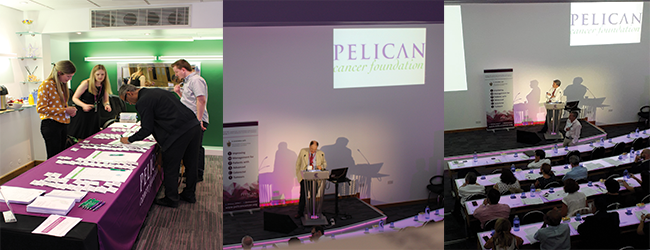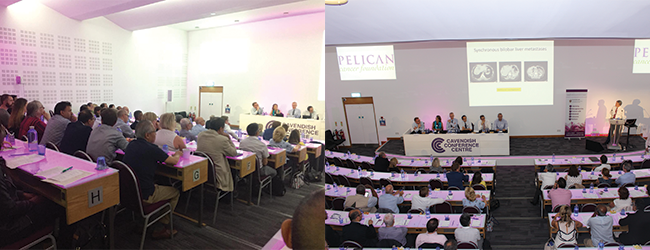On Friday 12th July, Pelican Cancer Foundation staff, faculty and delegates convened for our ninth Pelican IMPACT workshop in London. Comprising of 122 colorectal specialists from 14 hospitals, our one day programme comprised of 10 sessions that were delivered by 26 specialists from 11 different hospitals.
 |
Individual patient discussion to deliver the best possible care
Our innovative national development programme brings together these multi-disciplinary specialists who are treating patients affected by advanced colorectal cancer, to discuss the treatment pathway and complex areas through case examples. With the focus on patients, our aim through Pelican IMPACT is to concentrate on the outstanding care that is given – in order to make it even better.
Our session on ‘colorectal lung metastases’ presented by Mr. John Pilling, (Consultant Thoracic Surgeon, Guy’s and St Thomas’s NHS Foundation Trust), focused on the treatment of bowel cancer spread to the lung.
Mr. Pilling and a panel of different specialists presented a complex patient case in an open discussion with the audience, challenging the treatment options and pathway of care. Medical history (information) and scans provided a basis for the in-depth and lengthy discussion regarding patient management and treatment options between different specialists and hospital teams.
Decision making for each individual patient is intricate and complicated, and this discussion highlighted the breadth of expertise available within the region. It reiterated the necessity of multidisciplinary team involvement and for some cases, knowledge of other specialists in the region to refer to in order to ensure the best treatment for the patient.
We are thrilled with the outstanding feedback we’ve received from the day overall (as with the previous eight regional workshops) – reflecting the exceptional standard of learning on the day, delivered by a team offering a diverse range of talent.
One delegate commented: “Increased discussion of possible outcomes at beginning of patient journey – bad and good”. Another said the day was: “very well thought out…. powerful patient perspective videos…”
The more informed a patient is, the more they can make informed decisions about their treatment.
We’re looking forward to continuing our series of workshops with our next IMPACT meeting due to take place in Taunton on 13th September.
 |